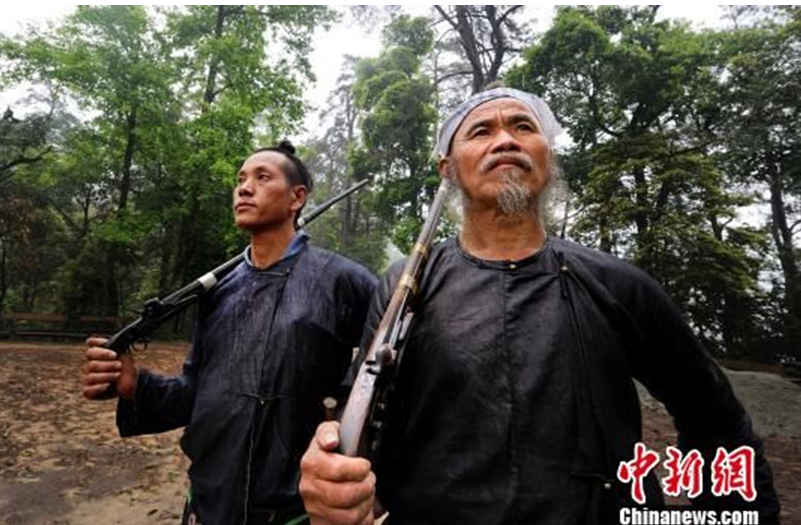
The Miao village of Biasha, in Guizhou province is known as the last village in China where people are allowed to own guns, so they're called "living Terra Cotta Warriors" and tourists come from far and wide to see the exotic culture, with its unique, mysterious customs.
 |
| Two Biasha villagers with their rifles. [Photo/ Zhangqi] |
Baisha is nestled among several villages, such as Zhaige, Wangjia, and has at least 22,000 members of the Miao ethnic group who practice their graceful folk songs and dances on holidays or weekends, amidst the verdant, thick trees.
But, what used to be a distant, remote culture is now open to the outside world because of a high-speed railway line that has shortened the distance between Biasha and the modern world. So, as Gun Shuige, a village guide, explains, "Almost 1,000 tourists visited Biasha this recent Tomb-sweeping holiday, and the ecology and environment and climate bring more."
One tourist from Guangdong province, Li Xiaoling, remarked, "The old customs, the hair that is cut with a sickle, and tree burial really opened my mind."
Tree burial that Li referred to is prevalent in the village and Gun goes on to explain, "My ancestors in the long past never had tombstones because the trees are their 'tombstones' and they form a forest."
He notes that the trees represent their spirit, because a sapling is planted on the gravesite rather than a tombstone, so they also represent the continuity of life.
The Biasha people say they descended from the Chiyou tribe of mythical warrior that fought with the Yellow Emperor, then fled to the Biasha area where they now have the strictest rules on the lumber business. If anyone break the "law", that person has to treat the whole village to a meal with meat and alcohol, explained one elderly villager.
The people also plant a tree when a baby is born and if something bad should happen to the children or the family, the children are taken to the tree to pray for good luck.
In addition to the tree burial, there are traditional festivals built around local customs and, according to Gun,"The cultural legacy of my ancestors make Biasha a special place in the modern world, but the tourism may bring the villagers better living conditions."
Statistics show around 86,000 tourists flooding into Biasha in 2014, bringing it 162 million yuan ($26 million) in profits, so the ecology and ethnic culture have given the village a wider reputation as a tourist destination.